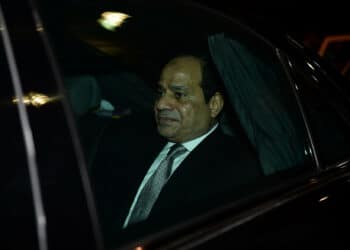Updated on March 1, 2023:
15 September 2022. Egypt's Supreme State Security Prosecution decided to release labor lawyer Haitham Mohamedain on a list of 46 political detainees.
Summary
Haitham Mohamedain is a labor activist and human rights lawyer who advocates for independent and worker-led trade unions. He has organized and led numerous social justice and democracy protests throughout Egypt.
Since 2011, successive Egyptian governments have attempted to silence him. National Security and police officers arrested Mohamedain on May 13, 2019 in al-Saff police station, Giza and forcibly disappeared him until May 16, 2019. He then appeared before the Supreme State Security Prosecution (SSSP) as a defendant in Case No. 741/2019. The SSSP accused him of collaborating with a terrorist organization with the intention of organizing anti-government protests during the Africa Cup of Nations football championship hosted by Egypt in 2019 and detained him at al-Qanater Men's Prison.
After a court decision on March 8, 2021, to release Mohamedain on probation, the SSSP re-accused him of the same charges, but in the new Case No. 1956/2019. The court's release order was never enforced and to date, Mohamedain remains in unlawful and endless pre-trial detention.
Methodology
DAWN researchers interviewed sources close to the detainee, investigated official documents, and consulted other information from published sources that we consider to be reliable. DAWN is not disclosing the identity of the interviewees to protect their security. They are referred to as indicated below, including the dates of the interviews:
- Interview with source A, on August 10, 2020.
- Interview with source B, on August 20, 2020.
- Interview with source C, on August 22, 2020.
- Interview with source D, on August 23, 2020.
- Interview with source E, on August 15, 2020.
- Interview with source F, on August 25, 2020.
Personal Background
Haitham Fawzy Mohamedain Mahmoud is a labor activist and human rights lawyer. He was born on August 4, 1982, in the suburbs of Giza, Egypt.
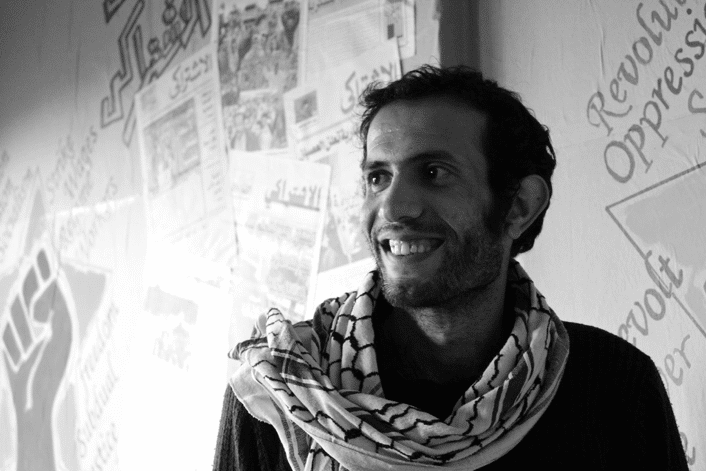
He graduated from Cairo University in 2004 with a Bachelor's Degree in Law.
He is the son of Fawzy Mohamedain, "the most famous labor leader in the history of [Egypt's] Iron and Steel Company [who] played a leading role in the Company's 1989 sit-in," according to Mada Masr. Mohamedain is unmarried.
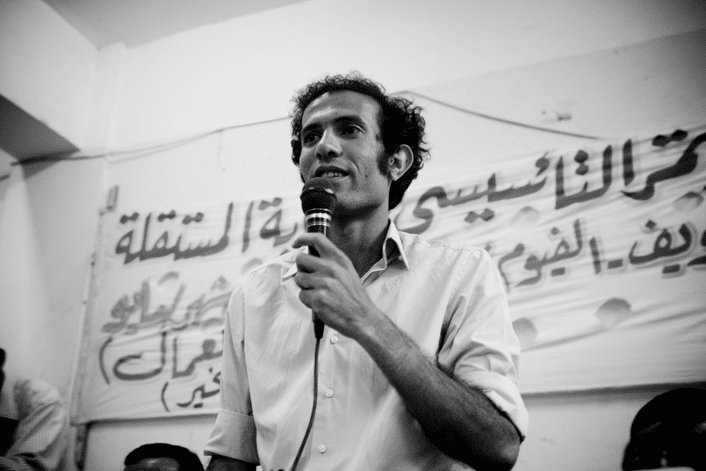
Professional Background
Mohamedain is a leading member of the Revolutionary Socialists in Egypt and co-founder of the Revolution Path Front, a youth-led coalition launched on September 24, 2013, to provide, according to Al-Ahram English, "an alternative to the […] "polarization" between the military and Muslim Brotherhood."
Mohamedain worked with the al-Hilaly Foundation for Rights and Freedoms, the Egyptian Commission for Rights and Freedoms (ECRF), and El-Nadim Centre for the Rehabilitation of Victims of Violence and Torture. In April 2017, he authored 'Your Prison, Your Home,' a handbook on arrest, interrogation, and prisons with the Arabic Network for Human Rights Information (ANHRI).
His activism and professional work have focused on promoting the rights of Egyptian workers, particularly their right to establish independent and worker-led trade unions.
According to journalist Sarah Carr's report, at the June 19, 2008 meeting of labor leaders and activists at Cairo's Center for Socialist Studies, Mohamedain said that "existing trade union legislation violates the Egyptian constitution by imposing conditions making trade union activity virtually impossible."
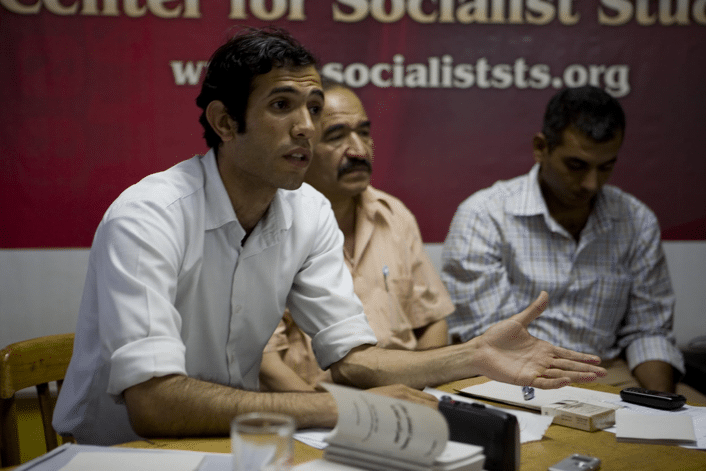
Mohamedain has been famous for his powerful chants—such as "A strike is legitimate against poverty and hunger," and "We want to create a new life […] where people come before profits"—at anti-government rallies.
Times and Circumstances of Arrests
Security forces have arbitrarily arrested and detained him several times, for expressing dissident views. State Security forces (renamed National Security forces) arrested Mohamedain on January 25, 2011. After interrogating him for a few days, they released him before the Friday of Anger, January 28, 2011, when Egyptians commenced their revolution against then-President Mubarak.
Mohamedain is an opponent of the Muslim Brotherhood and former President Mohamed Morsi. Yet he described the July 3, 2013 overthrow of President Morsi by General al-Sisi as "an outright military coup against democracy and the gains of the January 25 revolution that brought [to power] a military regime." This statement, according to ANHRI, led to "various forms" of governmental retaliation against him. As the following examples show, the government repeatedly has arrested and prosecuted Mohamedain for his peaceful activism and political expression:
In September 2013, on his way to support the workers' strike at a cement factory, army soldiers at the Suez checkpoint unlawfully arrested and apparently falsely accused him of assaulting an army officer; they released him 48 hours later with no charge.
In January 2015, the Egyptian General Prosecutor Hesham Barakat issued an order to seize the assets of 112 people alleged to be members or supporters of the Muslim Brotherhood. Mohamedain was on this list, although there is no evidence of his support or membership in the Muslim Brotherhood. Mohamedain had no seizable assets.
On April 22, 2016, security forces arrested Mohamedain for his role in criticizing the decision of President al-Sisi's government to hand over Tiran and Sanafir Islands to Saudi Arabia. The SSSP accused him of inciting protests and joining a terrorist organization and detained him for six months at Giza Central Prison (also known as Kilo 10.5 Prison), located at the Central Security Forces Camp on Cairo-Alexandria Desert Road, before releasing him in October 2016.
On May 12, 2018, after the government increased the price of metro tickets, outraged commuters clashed with security forces at Maadi metro station. Instead of rescinding the decision, the government responded by arresting at least 20 people over the protests, including Mohamedain, even though he had not participated in the protests. At dawn on May 18, 2018, according to ANHRI, unidentified security forces raided Mohamedain's house in the al-Saff district of Giza governorate.
They unlawfully arrested and moved him to an undisclosed location. Mohamedain appeared the next day before an unknown prosecutor at the Supreme State Security Prosecution (SSSP), which accused him of aiding a terrorist organization to achieve its goals and inciting the Maadi metro protests.
The prosecution decided to put Mohamedain in pre-trial detention pending investigation in Case No. 718/2018, commonly referred to in the media as the Case of the Metro Detainees. On September 28, 2018, the UN Special Procedures condemned the Egyptian authorities' "systematic targeting" of Mohamedain and other human rights defenders in the country.
On October 8, 2018, Judge Moataz Khafagy, Head of Circuit 14 of the Giza Criminal Court at the time, decided, in accordance with Article 201 (2) of Egypt's Code of Criminal Procedure, to replace Mohamedain's pre-trial detention with probation measures pending trial. This meant the authorities would release him from prison but require him to spend a few hours twice a week at the police station of his residential area.
Article 201 of the Code of Criminal Procedure stipulates:
The detention order shall be issued by the Public Prosecution for a maximum period of four days following the arrest of the accused or his transfer to the Public Prosecution if he was previously arrested. The authority deciding over the preventive detention may replace pretrial detention with one of the following measures:
1- Oblige the accused not to leave his residence or domicile.
2 – Require the accused to present himself to the police headquarters at specific times.
3 – Prohibit the accused from attending specific places.
If the accused violates the obligations imposed by the measure, he may be held in preventive detention.
On October 10, 2018, Judge Ahmed Abdelaziz Qatlan, Head of Circuit 29 of the Giza Criminal Court, confirmed the release order after the SSSP appealed against it. However, officers at the al-Saff police station held Mohamedain for an additional 19 days, before finally releasing him on October 29, 2018.
On January 5, 2019, the Giza Criminal Court reduced Mohamedain's probation to one day per week. The Court sent the decision to the SSSP via Communication No. 113.
According to Source C, seven months after his release, on May 12, 2019, an officer in al-Saff police station in Giza called Mohamedain to tell him that a complaint had been filed against him and that he had to come immediately to the police station. At the time, Mohamedain already had been spending two days per week, and then one day per week at this police station, from 8-10pm, as part of his probation in Case No. 718/2018.
According to the ECRF, once Mohamedain stepped inside al-Saff police station on May 13, 2019, uniformed police officers and plainclothes National Security officers arrested, blindfolded, and disappeared him. The MENA Rights Group reported that Mohamedain remained inside al-Saff police station between May 13 and May 16, 2019. After initially denying his presence, al-Saff officers informally admitted that Mohamedain was there, according to Source A, but did not allow his family or lawyer to contact him.
On May 14, 2019, al-Saff police officers submitted Police Report no. 22/2019, in which they accused Mohamedain of violating his probation requirement to report to the local police station, to the SSSP. On May 16, 2019, human rights lawyers attending sessions at the SSSP in Cairo unexpectedly saw Mohamedain when security forces brought him in.
Charges
Based on an inquiry report presented by National Security officers, SSS Prosecutor Yehia Marwan listed Mohamedain on May 16, 2019 as a defendant in SSSP Case No. 741/2019 (also known, according to Source B, as the Case of the Africa Cup of Nations) and charged him with the following conduct, without citing any relevant laws:
- Participating in a terrorist organization to achieve its goals
- Spreading false news and statements
- Misusing social media platforms
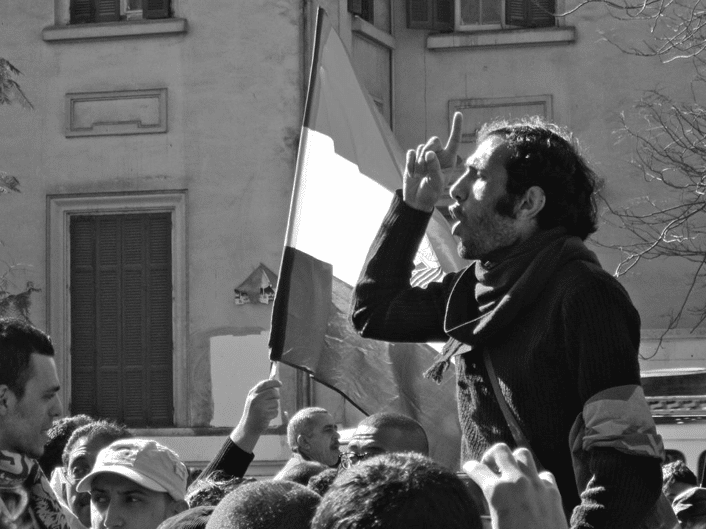
According to Source C, at Mohamedain's interrogation on May 16, 2019, Prosecutor Marwan asked Mohamedain whether he "intended" to call for anti-government protests during the Africa Cup of Nations football championship that Egypt was hosting between June 21 and July 19, 2019.
Source C noted that Mohamedain was alone during this interrogation with no lawyer, and that he denied these charges. In this interrogation, according to Source B, the Prosecutor did not reveal the names of the National Security officers who leveled the accusations and did not present any evidence to substantiate the charges against Mohamedain.
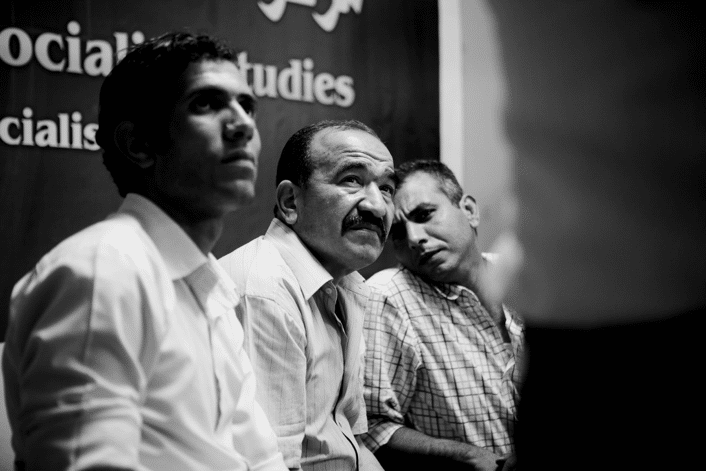
Prosecutor Marwan decided to put Mohamedain in pre-trial detention pending investigation in Case No. 741/2019. Security forces subsequently transferred Mohamedain to Giza Central Prison. Late in September 2019, the Ministry of Interior transferred Mohamedain to al-Qanater Men's Prison in Qalyobia Governorate.
Trial and Legal Proceedings
- May 16, 2019
Supreme State Security Prosecutor Yehia Omar Marwan added Mohamedain as a defendant to SSSP case no. 741/2019 and accused him of participating in a terrorist organization in order to achieve its goals, which Mohamedain denied. Prosecutor Marwan interrogated Mohamedain in the absence of his lawyers.He did not reveal the name of the officers from National Security who accused Mohamedain of the alleged violations, nor did he present any evidence against him. Prosecutor Marwan ordered Mohamedain into pre-trial detention for 15 days pending investigation even though he presented no evidence to establish any of the statutory conditions for pre-trial detention as stipulated in Article 134 of Egypt's Code of Criminal Procedure.
- May 27, 2019
The SSSP again extended the pre-trial detention of Mohamedain and Mostafa Maher, a defendant in the same case, for 15 days pending investigation.
- June 13, 2019
The SSSP again extended Mohamedain's pre-trial detention for 15 days pending investigation.
- July 8, 2019
The SSSP again extended Mohamedain's pre-trial detention for 15 days pending investigation.
- July 28, 2019
The SSSP again extended Mohamedain's pre-trial detention for 15 days pending investigation.
- August 7, 2019
The SSSP again extended Mohamedain's pre-trial detention for 15 days pending investigation.
- August 24, 2019
The SSSP again extended Mohamedain's pre-trial detention for 15 days pending investigation.
- September 8, 2019
The SSSP again extended Mohamedain's pre-trial detention for 15 days pending investigation. - September 24, 2019
The SSSP again extended Mohamedain's pre-trial detention for 15 days pending investigation. - October 2, 2019
The SSSP again extended Mohamedain's pre-trial detention for 15 days pending investigation.This session was Mohamedain's last renewal session before the SSSP. According to Article 142 and 143 of the Egyptian Code of Criminal Procedures, the prosecution has the right to renew the detention of a defendant pending investigations for up to ten consecutive sessions, with 15 days between every two sessions.In other words, the prosecution can extend the detention of a defendant for a maximum of 150 consecutive days. After the 150-day period, a Criminal Court (Terrorism Circuit or ordinary court) assumes the responsibility of the decision to end or extend the detention, with 45 days allowed to pass between each of two consecutive sessions.In total, the Code of Criminal Procedure limits the pre-trial detention period to 24 months.
After two years of imprisonment, it is mandatory to release the defendant. As a result, all of Mohamedain's next investigation sessions were to be conducted before a criminal court. It should be noted that some SSSP or court sessions may have been held that are not recorded here due to the absence of public documents in Mohamedain's case.
- November 27, 2019
Judge Mohammed Saeed el-Sherbiny, Head of the Fifth Terrorism Circuit of the Cairo Criminal Court, ordered the release of Mohamedain, Maher, and six others. They were placed on probation— required to report to the police station in their residential area one day per week—pending investigation in case no. 741/2019. The SSSP appealed the release and probation decision. - November 28, 2019
Judge Shabeeb al-Damarany Abu Asr, Head of the Third Terrorism Circuit of the Cairo Criminal Court, accepted the appeal filed by the SSSP against the release order for Mohamedain, Maher, and five others. Judge Abu Asr extended the defendants' pre-trial detention for 45 days.
- December 25, 2019
On December 25, 2019, the Cairo Criminal Court issued a release order for Mohamedain and Maher. The next day, the court reversed its release order following an SSSP appeal. Instead of releasing the defendants, the Court extended their pre-trial detention for 45 days pending investigation.
- February 19, 2020
Judge Moataz Khafagy, Head of the Second Terrorism Circuit, again extended the pre-trial detention of Mohamedain and Maher for 45 days pending investigation. - March 24, 2020
Judge Mohammed Saeed el-Sherbiny, Head of the Fifth Terrorism Circuit of Cairo Criminal Court, postponed the session to decide whether to end or extend Mohamedain's pre-trial detention after authorities at al-Qanater Men's Prison failed to bring him to the courthouse for his hearing, without explanation, according to the ECRF.The failure of al-Qanater Men's Prison to bring Mohamedain before the court violates Article 77 of Egypt's Prisons Organization Law No. 396 of 1956, which stipulates: "The prison's warden is responsible for implementing any order he receives from the Public Prosecution, from the investigating judge […] or from the court requesting he bring a prisoner; he shall see to it that the prisoner who is requested is sent at the specified date and time."
- May 3, 2020
According to Source F, Judge Moataz Khafagy, Head of the Second Terrorism Circuit of the Giza Criminal Court, was scheduled to hold a session on May 3, 2020 to decide on the pre-trial detention of Mohamedain in case no. 741/2019 and that of political activists in two other cases. While the lawyers were waiting for this session to start, the Court Bailiff and a SSSP employee told them that the session had been postponed to May 10, 2020.
On May 10, Source F stated that the lawyers appeared again for the hearing, but learned that the session had taken place on May 7, 2020, and that Judge Khafagy again extended the defendants' pre-trial detention for 45 days, in the absence of both the detainees and their lawyers.Between March and May 2020, the government issued a series of decisions to suspend the work of the administrative body of the state and the proceedings at most of the country's courts, in a bid to prevent the spread of COVID-19. As a result, the criminal courts automatically, and in some cases retroactively extended the pre-trial detentions of many detained human rights activists.
- June 15, 2020
Judge Moataz Khafagy, Head of the Second Terrorism Circuit of Giza Criminal Court, again extended Mohamedain's pre-trial detention for 45 days pending investigation.Khafagy made this decision in the absence of Mohamedain but after hearing his lawyer's defense plea.
- July 25, 2020
Judge Mohammed Saeed el-Sherbiny, Judge Wagdi Mohammed Abdel Moniem, and Judge Ali Emara of the Fifth Terrorism Circuit of Cairo Criminal Court again extended Mohamedain's pre-trial detention for 45 days pending investigation.El-Sherbiny made this decision in the absence of Mohamedain but after hearing his lawyer's pleas, as confirmed by source E.
August 4, 2020
Mohamedain marks his 38th birthday in detention.September 15, 2020
Judge Mohammed Saeed el-Sherbiny, Head of the Fifth Terrorism Circuit of Cairo Criminal Court, again extended Mohamedain's pre-trial detention for 45 days pending investigation.- October 23, 2020
The European Parliament called on the Egyptian authorities to "immediately and unconditionally release all human rights defenders detained or sentenced merely for carrying out their legitimate and peaceful human rights work," which included a specific reference to Mohamedain. - November 5, 2020
Judge Moataz Khafagy, Head of the Second Terrorism Circuit of Giza Criminal Court, again extended Mohamedain's pre-trial detention for 45 days pending investigation. - December 17, 2020
The Third Terrorism Circuit of Cairo Criminal Court, again extended Mohamedain's pre-trial detention for 45 days pending investigation. - March 2, 2021
The Third Terrorism Circuit of Cairo Criminal Court, again extended Mohamedain's pre-trial detention for 45 days pending investigation. - March 8, 2021
The Cairo Criminal Court ordered the release of Haitham Mohamedain on probation pending investigation in case no. 741/2019. - March 10, 2021
Following the pervasive prosecutorial practice of entrapping political detainees in endless "Revolving Door" or "Recycling" cases, Mohamedain appeared without his lawyer before the SSSP on March 10. The SSSP added him as defendant in a new case: SSSP Case No. 1956/2019, accusing him again of joining a terrorist organization."Recycling" cases refer to the practice whereby Egyptian prosecutors "recycle" the charges against a detainee in a new case because the detainee has already been held in pretrial detention for the maximum amount of time (two years) permitted by law. The new case allows prosecutors to start a new two-year period of pretrial detention without having presented evidence or completed a trial in the original case. In some cases, even where a court has found the detainee not guilty, the prosecution will recycle the same charges in a new case, again allowing them to continue a "pretrial" detention period of up to two years.
The Cairo Criminal Court's order, on March 8, 2021, to release Mohamedain on probation was never enforced.
June 9, 2021
The Cairo Criminal Court, headed by Judge Hassan Farid, renewed the detention of Mohamedain for 45 days, pending investigations.July 19, 2021
The Court again renewed Mohamedain's detention for 45 days on July 19, 2021.December 1, 2021
The Cairo Criminal Court's Terrorism Circuit renewed the detention of Mohamedain for 45 days, pending investigation.
January 10, 2022
The Cairo Criminal Court's Terrorism Circuit renewed the detention of Mohamedain for 45 days, pending investigation.
- September 15 2022—–Egypt's Supreme State Security Prosecution decided to release labor lawyer Haitham Mohamedain on a list of 46 political detainees.
Detention Conditions
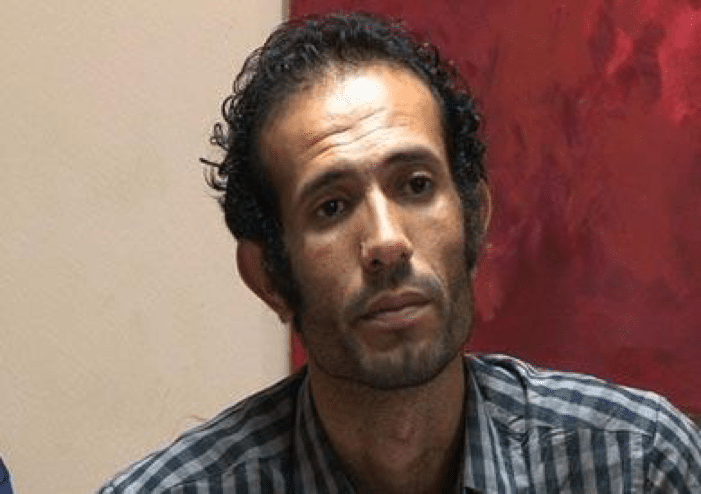
According to a report by the Egyptian Front for Human Rights, National Security officers threatened and verbally abused Mohamedain during his enforced disappearance, from May 13 to May 16, 2019, inside al-Saff police station.
- According to Source C, the detention conditions in al-Qanater Men's Prison are inhumane. For months at a time, the prison administration has prevented Mohamedain from exercising outside his cell and communicating with other prisoners. Al-Qanater, continued Source C, also lacks basic hygienic and medical protection against COVID-19.
- Source A reports that Mohamedain's cell in al-Qanater suffers from poor ventilation and that the prison administration has prevented him from receiving books and medication for his back pain sent by his family.
- According to Source C, between March 2020 and August 22, 2020, prison authorities banned Mohamedain from communicating with his family via letters or phone calls. Prison authorities banned all family visits for all prisoners between March 9 to August 22, 2020 as a precautionary measure against the spread of COVID-19.
Impact on Family
Source C told DAWN researchers that since Mohamedain's transfer from Giza Central to al-Qanater Men's Prison, family visits, when permitted, were costly and tiring for his family, as they reside in Giza Governorate, approximately 60 miles away.
The family has not been able to visit Mohamedain since March 2020 because of the Ministry of Interior's announced measures to combat the COVID-19 pandemic. Family visits resumed on August 22, 2020.
Violation of Rights
The Right to Freedom of Expression, Association, and Participation in Public Affairs
Article 19 of the Universal Declaration of Human Rights ('Universal Declaration') and Article 19(1) of the International Covenant of Civil and Political Rights (ICCPR) grants each individual the right to freedom of opinion and expression. The right precludes the State from harassing or intimidating a person by virtue of the opinions they hold, and from attempting to coerce the holding or not holding of any opinion (see, General Comment No. 34, paras. 9-10). There can never be any justification for the restriction of freedom of speech rights where the speech in question advocates for democratic tenets and human rights (see, Communication No. 458/1991, Mukong v Cameroon, para. 9.7).
The Egyptian authorities breached Article 20(1) of the Universal Declaration, which guarantees the right to peaceful assembly and association, by arresting Mohamedain for participating in and organizing peaceful protests and labor actions.
The government arrested Mohamedain for his peaceful speech and advocacy, which constitutes a severe violation of Article 19. The Human Rights Committee has noted its concern surrounding laws intended to punish people for disrespecting authority and criticizing public officials (see, General Comment No. 34, para. 38).
[Article 18-20, Universal Declaration of Human Rights (UDHR); Article 19, 22, 25, International Covenant of Civil and Political Rights (ICCPR)]
The Right to Freedom and Security
National Security and police officers arbitrarily detained Mohamedain once he arrived at al-Saff police station on May 13, 2019. Security officers did not show Mohamedain an arrest warrant and falsely told family members they were not holding him inside the police station. A policeman eventually revealed, informally, that Mohamedain was inside the police station. However, the officers still did not allow Mohamedain to communicate with his lawyer or family.
[Article 14, Arab Charter on Human Rights; Article 9 (1), International Covenant on Civil and Political Rights (ICCPR); Article 3, 9, Universal Declaration of Human Rights (UDHR)]
The right not to be subjected to enforced disappearance
National Security and al-Saff police officers forcibly disappeared Mohamedain between May 13 and May 16, 2019, risking his security by placing him outside the protection of law.
[International Convention for the Protection of All Persons from Enforced Disappearance (Convention CED); Principle 1, 6, Principles on the Effective Prevention and Investigation of Extra-legal, Arbitrary and Summary Executions]
The right to humane and dignified treatment
National Security officers reportedly threatened Mohamedain with violence and verbally abused him inside al-Saff police station between May 13 and 16, 2019. Also, the administration of al-Qanater Men's Prison prevented Mohamedain from receiving books and medications for back pain sent by his family.
[Article 15, 16, 30, Egypt's Prisons Organization Law No. 396 of 1956; Article 55, 56, Egypt's Constitution; Article 5, African Charter on Human and Peoples' Rights; Article 5, UDHR; Article 7, ICCPR; Article 1, Convention against Torture and Other Cruel, Inhuman or Degrading Treatment or Punishment (CAT)]
The right to a fair trial
The decisions of the SSSP and the Terrorism Circuits to keep Mohamedain in pre-trial detention violate the Egyptian Code of Criminal Procedure and international law. The SSSP ignored the legal requirements for holding Mohamedain in pre-trial detention, did not present any evidence to back the charges against him, and refused to identify the National Security officers who leveled accusations against him. The criminal courts postponed hearings on Mohamedain's pre-trial detention and extended his detention in his and/or his lawyer's absence on multiple occasions.
According to Article 136 of the Code of Criminal Procedure No. 150 of 1950, and amended by Law 145 of 2006, "The investigating judge must, before issuing a detention order, hear the statements of the Public Prosecution and the defense of the accused." Article 142 stipulates, "Pre-trial detention ends after the 15 days have passed since the accused is imprisoned, yet the investigating judge may […] and after hearing the statements of the Public Prosecution and the accused, issue an order to extend the imprisonment for similar periods so that the detention period does not exceed in a total of forty-five days." The indispensability of hearing the detainee's defense is further highlighted in Article 143 as well.
Renewing Mohamedain's detention without actually holding sessions in his presence and allowing him to make arguments violates both Egyptian and international law. The authorities released a number of defendants in the same case, accused of similar charges, raising concern that authorities were targeting Mohamedain, who has been a prominent leader fighting for social justice
Prosecutors presented no evidence that Mohamedain met the statutory criteria for pretrial detention, for example presenting a flight risk or a danger to the community.
[Article 77, Egypt's Prisons Organization Law No. 396 of 1956; Article 96, Egypt's constitution; Article 13, 14, 16 Arab Charter on Human Rights; Article 7, African Charter on Human and Peoples' Rights; Article 14, ICCPR]
o The right to defense and legal representation [Article 54, Egypt's constitution; Article 16 (3, 4) Arab Charter on Human Rights (ACHR); Article 14 (3 b, d), ICCPR; Section A, article 2 (f), Principles and Guidelines on the Right to a Fair Trial and Legal Assistance in Africa; Principle 17 (1, 2), 18, Body of Principles for the Protection of All Persons under Any Form of Detention or Imprisonment; Rule 93, Standard Minimum Rules for the Treatment of Prisoners; Principle 7, 8, Basic Principles on the Role of Lawyers]
o The right to reasonably-timed trial or release [Article 54, Egypt's constitution; Article 14 (5, 6) Arab Charter on Human Rights; Article 9 (3) ICCPR; Principle 37, 38, Body of Principles for the Protection of All Persons under Any Form of Detention or Imprisonment]
The right to physical and mental health
The administration of al-Qanater Men's Prison reportedly have placed Mohamedain in a cell with poor ventilation and hygienic protection against COVID-19. They also prevented him, for months, from exercising outside his cell and receiving medication for back pain sent by his family.
[Article 33, Egypt's Prisons Organization Law No. 396 of 1956; Article 18, 55, Egypt's constitution; Article 14 (4) Arab Charter on Human Rights; Article 25 (1), UDHR; Article 12 (1), ICESCR; Principle 9, Basic Principles for the Treatment of Prisoners; Principle 24, Body of Principles for the Protection of All Persons under Any Form of Detention or Imprisonment]
The right to communicate with the outside world, especially with his family.
Between March 10, 2020, and August 22, 2020, the administration of al-Qanater Men's Prison banned Mohamedain and other political prisoners from family visits, phone calls, and letters, allegedly as part of the Ministry of Interior's precautionary measures to combat the spread of COVID-19 inside Egypt's prisons. The authorities did not explain why phone calls or letters created a risk of coronavirus spread. DAWN researchers have not been able to ascertain if Mohamedain has been able to visit with his family since August 22.
[Article 38, Egypt's Prisons Organization Law No. 396 of 1956; Article 54, Egypt's constitution; Article 21, Arab Charter on Human Rights; Article 12, UDHR; Article 17 (1, 2), ICCPR; Principle 19, Body of Principles for the Protection of All Persons under Any Form of Detention or Imprisonment; Rule 37, 39, 79, 92 Standard Minimum Rules for the Treatment of Prisoners]
Officials Involved in Prosecution and Detention
- Yehia Omar Marwan, Supreme State Security Prosecutor
Marwan used his prosecutorial discretion to prosecute Mohamedain for his peaceful speech and activities, protected by international human rights law and Egyptian constitutional law. He also unlawfully kept Mohamedain in pre-trial detention. On May 16, 2019, Prosecutor Marwan ordered Mohamedain held in pre-trial detention for 15 days pending investigation in case no. 741/2019 but presented no evidence to support the charges against him. The only evidence presented in this case was a report from National Security officers whom the Prosecutor declined to identify.
Egyptian law—in line with regional and international legal provisions— envisaged pre-trial detention as an exceptional and limited measure to guarantee the integrity of the preliminary investigation. Therefore, as stipulated in Article 134 of the Code of Criminal Procedure No. 150 of 1950, and amended by Law 145 of 2006, it permits pre-trial detention only "if one of the following cases or reasons is available:
- In flagrante delicto [if the defendant was caught in the act of committing the crime].
- Fear of the escape of the defendant
- Fear of harming the interest of the investigation , whether by influencing the victim or witnesses, or by tampering with the evidence and physical clues, or by making agreements with the rest of the perpetrators to change the truth or obscure its features.
- Preventing serious breaches of security and public order that may result from the gravity of the crime.
However, the accused may be held in remand if he does not have a fixed permanent place of residence in Egypt, and the crime is a felony or a misdemeanor, punishable by imprisonment."
According to several lawyers with whom DAWN discussed this case, since Mohamedain has a known permanent place of residence in Egypt, the failure of the SSS Prosecutor to make clear which of the above stated preconditions were met in his case or to present evidence of their existence casts serious doubts on the legality of the decision to hold him in remand detention.
- Khaled Diaa el-Din, First Attorney General of the SSSP
Prosecutor Khaled Diaa el-Din bears overall responsibility for SSSP prosecutions, including the decision to prosecute Mohamedain for his peaceful speech and activities, protected by international human rights law and Egyptian constitutional law. He also bears responsibility for Mohamedain's unlawful pretrial detention. He signed all SSSP decisions permitting and extending the unlawful pre-trial detention of Mohamedain. Lawyers who specialize in SSSP cases told DAWN that the SSSP issues all of its decisions in the name of the First Attorney General of the SSSP. It does not use the names of the interrogators or prosecutors who actually question and prosecute the defendants.
- Judge Moataz Khafagy, Head of the Second Terrorism Circuit of the Giza Criminal Court
Judge Moataz Khafagy extended Mohamedain's unlawful pre-trial detention on February 19, May 7, June 15, and November 5, 2020 even though no evidence was presented to establish any of the statutory conditions for pre-trial detention as stipulated in Article 134 of Egypt's Code of Criminal Procedure. He did so, even though the charges against Mohamedain related to his peaceful speech and activities, protected by international human rights law and Egyptian constitutional law. He provided no reasons for his decisions to extend Mohamedain's remand detention, in violation of Article 136 of Egypt's Code of Criminal Procedure which stipulates that:
Before issuing a detention order, the investigating judge must hear the statements of the Public Prosecution and the defense of the accused. The detention order must include an explanation of the crime attributed to the accused, the penalty prescribed for it, and the reasons upon which the order is based. The provision of this article shall apply to orders issued to extend pre-trial detention, in accordance with the provisions of this law.
On May 7, 2020, Khafagy extended Mohamedain's remand detention without his and his lawyer's presence, and on June 15, 2020 in the absence of Mohamedain but after hearing his lawyer's defense plea. These decisions violated Articles 136 and 143 of Egypt's Code of Criminal Procedure, which stipulate that before issuing a detention order, "the investigating judge must hear the statements […] of the defense of the accused," and that "extending remand detention" must be preceded by hearing "the statements of […] the defendant."
- Judge Shabeeb al-Damarany Abu Asr, Head of the Third Terrorism Circuit of the Cairo Criminal Court
Judge Abu Asr extended Mohamedain's unlawful pre-trial detention on November 28, 2019 even though no evidence was presented to establish any of the statutory conditions for pre-trial detention as stipulated in Article 134 of Egypt's Code of Criminal Procedure. He did so, even though the charges against Mohamedain related to his peaceful speech and activities, protected by international human rights law and Egyptian constitutional law. The absence of the reasons for his decision to extend Mohamedain's remand detention violated Article 136 of Egypt's Code of Criminal Procedure.
- Judge Mohammed Saeed el-Sherbiny, Head of the Fifth Terrorism Circuit of the Cairo Criminal Court
Judge Mohammed Saeed el-Sherbiny extended Mohamedain's unlawful pre-trial detention on July 25, 2020 even though no evidence was presented to establish any of the statutory conditions for pre-trial detention as stipulated in Article 134 of Egypt's Code of Criminal Procedure.
He did so, even though the charges against Mohamedain related to his peaceful speech and activities, protected by international human rights law and Egyptian constitutional law. The absence of the reasons for his decision to extend Mohamedain's remand detention violated Article 136 of Egypt's Code of Criminal Procedure.
El-Sherbiny extended Mohamedain's remand detention in Mohamedain's absence but after hearing his lawyer's plea. This decision violated Articles 136 and 143 of Egypt's Code of Criminal Procedure, which stipulate that before issuing a detention order," the investigating judge must hear "the statements […] of the defense of the accused," and that "extending remand detention" must be preceded by hearing "the statements of […] the defendant."



